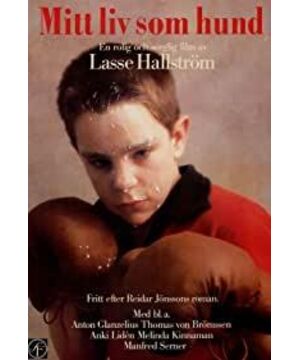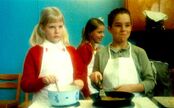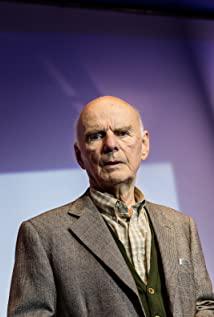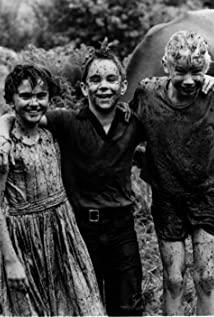someone is comparing the movie with Chinese education, and thinks that the idea of a child in the story is very interesting. He can think about death all day long, and he can talk about love with adults, and talk about the most beautiful woman in a small factory And so on, while Chinese children always live in a depressing environment. But in fact, I think it needs to look at people. The movie does not describe a healthy environment. This is the same as Chinese education. The point I agree with is that children who are sensitive, suspicious and lonely are not all children. Because of the environment (the environment plays a big role, especially in the teenage years, as evidenced by many people growing up and other stories), we can even say that there is no completely healthy environment, because this is not an experiment, Each person is not a variable, and can regulate and judge whether it is qualified or not, and whether there is an appropriate response to each other. But to really connect with China, its relationship between children and women is somewhat similar to "Sunny Days" (but it's not as good as "Yang", because it's not strong enough), or similar to Feng Tang When I write about girls, but I don't like this type of description, especially in China, the male sexual consciousness is in a state of chaos, and the women are also chaotic, with a mysterious sense of shame, I don't like it Such shame.
The part I like is when Ingmar says he always thinks of people, people running on the track with a javelin stuck in their chest, boys going to Boston for a kidney transplant, famous but still dead Now, when I think of the woman who went to preach in Ethiopia, she was beaten to death, the man who was going to break the world record, the man whose car leaped over the bus, he took 31 buses, maybe 30 of them were lined up, and he would not die Now, and the dog he imagined being sent into space, used it well at first, saying that her brain and heart were full of wires, she spent five months on it, and after eating the dog food, she I'm starving, I like this description, I can't say why, I like these imaginary scenes, but I don't like having to put a reason behind it, because "compare with others, because it could be worse" , as if because of this I cannot consider myself unhappy. The dog is always mentioned later in the movie, which I think is too much. There are also too many Ingmar hiding in the uncle's hut and crying with her head buried in the quilt in the morning, saying why don't you want me, Mom, say it twice, maybe some audience will cry when they see this kind of line, but I I feel that there are too many lines like this, and the audience who likes to see their emotions expressed in words and crying are really not really the audience of this type of movie, because they are too kind. The reason why I don't like this line is because it is too much, and the second is because Ingmar takes his relationship with his mother too seriously in the movie. In this relationship, he works too hard, Compared to my mother's reaction, this effort by Ingmar bores me.
Others see good intentions, but many of what I have seen may not be called malicious, but they are between good intentions and malicious, and it is not easy to distinguish. Like the guy who hangs a leather rope and rides a unicycle on it to keep his balance, everyone is going to look at him, saying he's smart, he knows the answer to all the questions, he can ask him all the questions, someone asks him the names of all the presidents of the United States, He came out on his back. He fell off the rope and looked like he was dead. Everyone leaned over to look at him. They were more curious than worried. Someone squatted next to him and asked him a question. He sat up and answered. That question, making a gesture that a hero is about to start reciting, and finally saying, "The rope must be tied tightly," made everyone laugh again. All these behaviors strike me as weird, people don't really think he's smart, he's not interesting, it's not interesting to watch him ride a unicycle on a rope, he maintains a very blind relationship with people, no one Who really cares. And the influence this person brought to the protagonist, the little boy, is that Yingma was playing a boxing match with other children. He fell from the second floor to the haystack on the first floor. When I got up, I also said, "It's just that the rope has to be tied tightly." I hate this kind of learning, this kind of repetition, and this kind of self-protection that is empty because there is no other confrontation state.
The only relationship I like is the story of Ingmar and the little girl in my hometown, because there is no weird part in this relationship, the little girl cares about him, but can't understand him and why Ingmar's mother After being sick, he can't stand the noise, or he'll scream like crazy. He doesn't understand why Ingmar's father packs bananas at the equator so he doesn't go home. Fake bananas", when she said, "Others can do it", Ingmar replied to her, "Here again! Who will do it, who will do the bananas", she didn't know what to answer, but she was obviously not persuaded. Then she said to Ingmar: Anyway, I will miss you, she accompanied Ingmar to buy Christmas gifts for her sick mother, self-service bread machine, she picked one but Ingmar said no, she asked why, Ingmar Said I didn't like it, she asked why, Ingmar said it would make her nervous, but in fact Ingmar herself was frightened by the popping sound, so she said she didn't understand Ingmar, the last bread machine she picked, she Said "this is to be watched while baking, but she is a patient", but Ingmar took out the bread machine and said "Look, pull it off, the bread can turn itself", and later because the conversation was interrupted, there was no Continue, but have seen the incomprehension between them, she will say "she has two children, of course tired", will say "you leave home for a while, it's good for her". So Ingmar says at the very beginning of the movie that she can only marry a southerner.
Writing this, I suddenly realized that what I don't like is Ingmar's take-it-all attitude. Like "Alive", it tells people to live and endure no matter what, but sometimes it doesn't make sense at all.
View more about My Life as a Dog reviews











